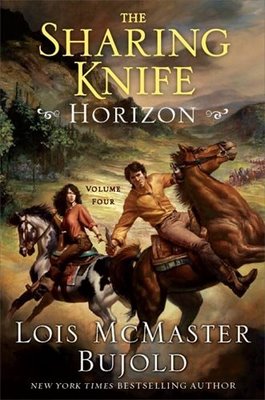I didn’t re-read the first three Sharing Knife books before reading Horizon, having re-read them so recently. But I think it’s best to consider them all as one thing, because they don’t in any way stand alone. As one thing, I liked the first two, but I loved the second two. As they widen out, they get better and more interesting, and Horizon, which is the widest so far, is also the best. If you found the first two too slow, that’s not likely to be a problem with the others. They remain resolutely small scale and intimately focused, but that’s a virtue.
In my last post about these books, I talked about how they were Western fantasy, using the early history of the colonization of America to create a solid interesting fantasy world that’s different from all the other fantasy worlds. This time, I want to talk about the influence of Tolkien on them.
Everybody who writes fantasy now is influenced by Tolkien, even if only to violently react against him (China Mieville, Michael Moorcock). Some people slavishly imitate him (Terry Brooks) and others work to do their own thing inside the genre he shaped (Robert Jordan, Patrick Rothfuss). Now Tolkien wasn’t setting out to invent genre fantasy. I suspect he’d have been quite horrified to know that was what he was doing. But what he was doing in writing The Lord of the Rings was so powerful in terms of setting everyone’s imagination alight that genre fantasy followed along as a sort of inevitable consequence. What most people have done with it are variations on Tolkien’s main theme. What Bujold’s doing here is a very interesting extrapolations and variation on some of his minor themes.
In the last thread on these books, at comment 25 Lois says that her character Berry is her take on a “river maiden” in “the American version,” as opposed to Tolkien’s Goldberry. Berry is the boss of a riverboat. Nifty. “Tussling with Tolkien. Aren’t we all?” she writes. Well, yes, we certainly are.
Similarly, the Lakewalkers are a fascinating variation on the concept of Rangers, taken deeper and closer than any Rangers I’ve ever run across. Their whole way of life for countless generations has been dedicated to destroying Malices. In this world there was a great evil, and in defeating it it broke up into thousands of pieces, the Malices of the present day, which remain dormant underground until they erupt and start eating life. There are a lot of them, but not an infinite number, and as long as the Lakewalkers keep destroying them they’ll eventually stop being a problem. Meanwhile, the Lakewalkers are utterly dedicated to destroying them. They fight ultimate evil frequently—Dag can’t remember how many Malices he’s seen, only the twenty-six he’s slain personally. The Lakewalkers are a people who keep themselves apart—the entire personal plot of the books revolves around how unusual Dag and Fawn’s mixed marriage is. They live longer than ordinary people, they have unique Malice-killing abilities, and they have groundesense—magic—which the farmers don’t. They define their houses as tents and their home bases as camps, because at least in theory they are always moving to deal with the Malices.
The Malices are always a threat, and Lakewalker bones and souls are what destroy them, through the sharing knife that is the name and central concept of the books. The Lakewalkers are protecting the farmers they mostly despise and making a safe area for them to live in.
In Horizon we see them in the South, where there aren’t any Malices, where they’ve changed and grown richer they’re fading back into the general population, just as Tolkien has his Numenorians doing. They are Lakewalkers but they aren’t walking around the Lake, because there aren’t any Malices in the South. Dag starts to ask the question of what will happen when there aren’t any Malices left. The Lakewalkers have been regarding farmers as part of their support system. The Lakewalkers have in fact been living in a post-apocalyptic situation, and have formed a post-traumatic stress culture, but the farmers, who have been protected in safe land all this time from what they call blight bogles, and are increasing in population and developing technology hand over fist. So there’s this culture clash, there’s a real threat, and there’s a real question of what happens afterwards.
Also in Horizon we get another really bad Malice outbreak. Nobody writes exciting as well as Bujold does when she’s in good form, and she’s in absolutely breathtaking form here. As well as giving us personal development and a look at more of the world, we also get a hair-raisingly tense story. And there’s a beautiful leathery bat-winged Malice that’s definitely reminiscent of the Witch King of Angmar, but also entirely and horribly itself.
You don’t need to write a quest to get rid of jewelry to be walking in Tolkien’s footsteps, and it’s all the better if you don’t.










